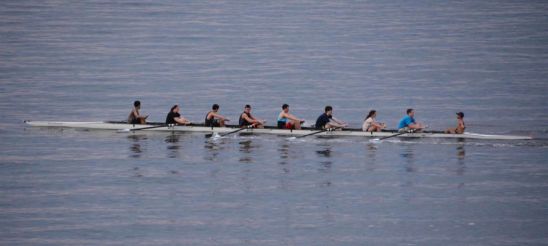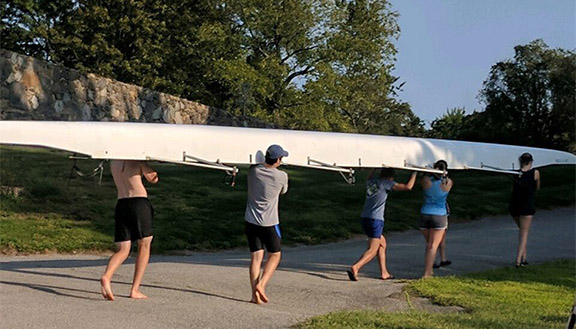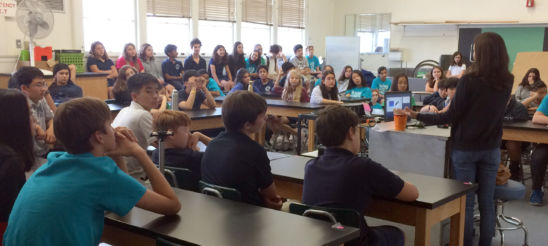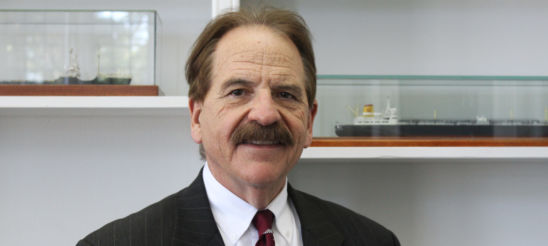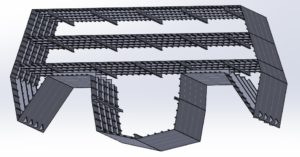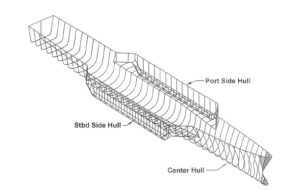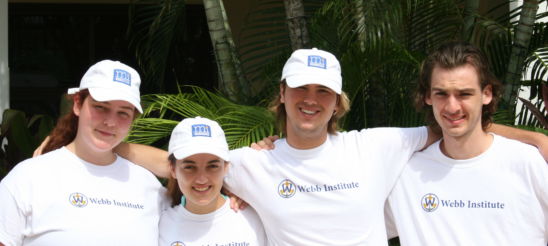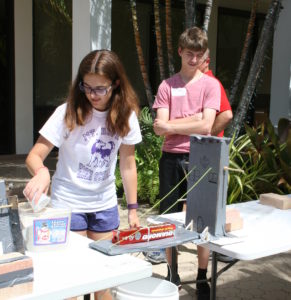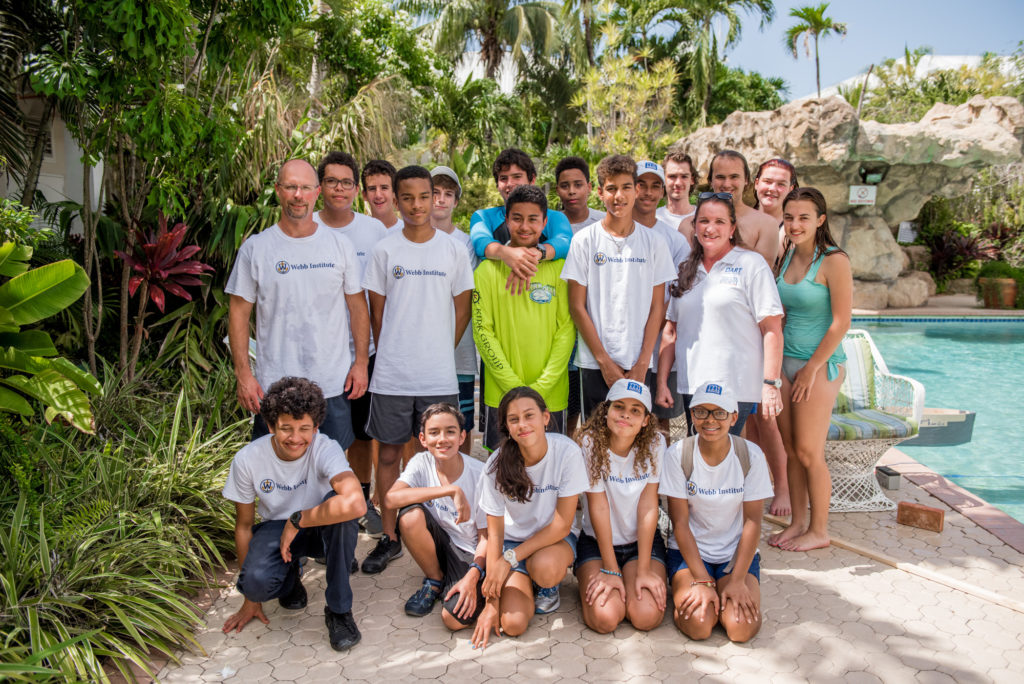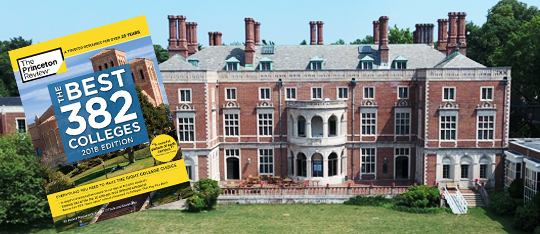Webb’s Rowing Club Grows
By Alexander Bidwell ’21, Rowing Team Captain
Webb Institute Crew has kicked off its fifth season with a great first round of practices. Over the past few weeks we’ve had strong turnouts of both experienced and novice rowers. Although the program is in its infancy, we are fortunate to have several dedicated members eager to share their love of rowing by helping coach fellow teammates. The program currently has basic equipment including one set of sweep oars, slings, and two Vespoli 8+ (8 man + cox) rowing shells. This equipment was donated to Webb and has enabled us to get the program started.
While our 8+ shells are working well, they are not ideal for a program of our size. A 4+ shell would greatly benefit our team, allowing us to practice more frequently and possibly introduce sculling to more experienced rowers. In addition, a 4+ would provide more flexibility when coordinating races and scrimmages. We are also interested in acquiring a 2-man shell.
If you have a 2 or 4+ shell you are interested in donating to Webb’s rowing program, please contact President Michel at ude.bbew@lehcimk or 516 671-2277. Your contribution of such a vessel may qualify as a charitable tax deduction.
Leah Sosa ’08 Teaches Reed Middle School Students About Hydrodynamics, Webb Institute
This September, Webb Alumna and Hydrodynamicist Leah Sosa ’08 visited science classes at Walter Reed Middle School in North Hollywood, California. Sosa, who graduated from Walter Reed M.S. in 1997, shared her experiences at Webb Institute and on the job in the STEM field of Hydrodynamics.
Following are some excerpts from student responses, thanking Leah for her visit to their classes:
“Thank you so much for taking time out of your day to come talk to us! It was very cool to see what a former IHPer can do with her life and it made me think about my future. The Webb Institute seems like an amazing school with an incredible experience, and it is very helpful that it is tuition free. I also thought that it was very interesting to see one of the experiments you did. Science experiments are super fun at school, and to see them being applied to real life is awesome! Your presentation made me dream of big things to accomplish when I get older and have a job.” – Amelie Missig’18
“Your presentation showed me that if you focus on your academic career, you can go to new and unexpected places, especially if you are unsure what you want to do later in life. I was shown first-hand that, as opportunities arise, your expectations and plans can drastically change – even lead you to another country.” – Enzo Banal’18
“It really opened my eyes about thinking for my future. Like, which college I want to go to, what I should major in, and what job I want. Your section about Webb Institute made me remember that there are schools other than UCLA, Stanford, Harvard, and other popular schools. Your presentation, how you really were not sure what you wanted, reminded me of myself. I am going to research jobs and colleges to get ready.” – Caira Paredes’18
“I was fascinated by the fact that you went to a college that had waived tuition so that you would not have to pay for college. The presentation made me think about how I will soon go to visit colleges and universities, and it will only be a matter of time before I start applying for them.” – Jeffrey Kwon’18
Webb Professor to Present Paper at FAST 2017 Conference in France
Webb Institute Professor John C. Daidola, P.E. will be presenting a paper on large trimaran ship structural design at the FAST 2017 conference in Nantes, France, September 27-29, 2017.
The meeting is considered the world’s leading conference addressing fast sea transportation and is a biannual event on research for design, construction and operation of these systems, both naval and commercial. The first conference, which was held in Trondheim, Norway in 1991.
Dr. Daidola’ s work has focused on structural design characteristics obtained from alternative procedures based on classification society rules for monohulls and trimarans as well as more traditional naval based design approaches for monohulls. His paper at the meeting will focus on evaluating the resultant structural designs by applying an analytical approach embodying finite grillage models of the hull structure.
This work was supported by the Office of Naval Research (ONR) under grant no. N00014-10-1-0652.
See Dr. Daidola’s designs below.
Renee Tremblay ’20 Travels to Cayman Islands as SEA Counselor
by Renee Tremblay ’20
This past summer, I had the opportunity to work as a counselor at Webb’s Summer Engineering Academy (SEA), led by Dean Matthew Werner. I chose to spend my summer with Webb because I enjoy leading projects for kids, and helping others discover engineering. During the month of July, I lived on campus, helped run the weekday camp at Webb, and introduced young students to engineering with many fun, hands-on projects and team competitions.
When I signed up to be a camp counselor, I had no idea I would end up on an island paradise for a week, as a part of SEA. At the close of freshman year, I learned that the SEA program was going abroad to the Cayman Islands. After the two busy, tiring-but-worth-it sessions with about 35 campers at Webb, I hopped on a plane bound for George Town, Grand Cayman for one more week of teaching and enjoyment with three of my classmates, Ian Cavanaugh ’20, John Dixon ’20, and Isabel Hill ’20. We were kindly set up in a fantastic condo on the beach, in walking distance of the venue where we would work during the week.
Before the program got started, I got to explore the island, relax on the beach, snorkel, and swim with stingrays! On Monday morning, we headed into work early to set up and anxiously await the arrival of the 15 local scholars who we were going to work with. The SEA students each wrote an essay, and were selected by Minds Inspired, a scholarship provider funded by the Dart Group, that focuses on fostering excellence in science and math in Caymanian students. Once the students arrived, we were greeted by a multitude of different accents and great personalities. The group was incredibly focused, and excited to be part of the program.
The week combined classroom time with various design and build projects, all leading up to the capstone, boat-building, team competition. The materials for the project included a sheet of plywood, cable ties, duct tape, silicone sealant, wiring, switches, and motors. From these materials, teams had to construct a brick-carrying boat to race around in a pool in various competitions. The boat race is my favorite project because it really challenged the students in naval architecture, a field they previously did not know a lot about. It’s unfortunate that boat design and engineering are not well known in the Cayman Islands, where most goods arrive by sea.
I think the SEA program really benefited the students who were involved, and I hope it inspires them to explore various fields of engineering in their future academic careers. I hope this trial run of the Summer Engineering Academy in the Cayman Islands plants the seed that allows the program to continue to grow there in the future. Special thanks to Chairman of the Board Bruce Rosenblatt for connecting Webb with the Dart Group and Minds Inspired and to the Dart Group for arranging the SEA program in the Cayman Islands and for hosting us during our stay.
Minds Inspired SEA Cayman Video
Webb Institute Featured in The Princeton Review Book, “The Best 382 Colleges: 2018 Edition”
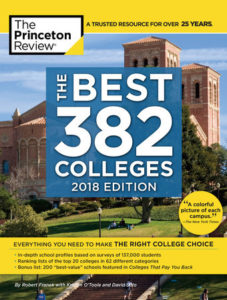 Webb Institute is one of the nation’s best institutions for undergraduate education, according to The Princeton Review. The education services company features the school in the new 2018 edition of its college guide, “The Best 382 Colleges” (Penguin Random House / Princeton Review, $24.99, August 1, 2017).
Webb Institute is one of the nation’s best institutions for undergraduate education, according to The Princeton Review. The education services company features the school in the new 2018 edition of its college guide, “The Best 382 Colleges” (Penguin Random House / Princeton Review, $24.99, August 1, 2017).
Only about 15% of America’s 2,500 four-year colleges and two colleges outside the U.S. are profiled in the book, which is one of The Princeton Review’s most popular guides. Published annually since 1992, it has detailed profiles of the colleges with rating scores in eight categories. The book also has ranking lists of top 20 schools in 62 categories. All of the ranking lists are based on The Princeton Review’s surveys of students attending the colleges.
“We chose Webb Institute for this book because it offers outstanding academics, “said Robert Franek, Princeton Review’s Editor-in-Chief and author of “The Best 382 Colleges”. “Our selections are primarily based on our surveys of administrators at several hundred four-year colleges. We also visit dozens of colleges each year and give considerable weight to opinions of our staff and our 24-member National College Counselor Advisory Board, most importantly, we look at valuable feedback we get from each school’s customers – our surveys of students attending them. We also keep a wide representation of colleges in the book by region, size, selectivity and character.”
President R. Keith Michel comments, “We are pleased that the Princeton Review has again acknowledged Webb’s commitment to excellence in education, by selecting Webb as one of its 382 Best Colleges.”
In its profile on Webb Institute, The Princeton Review praises it for its “100 job placement rate” and quotes extensively from Webb students the company surveyed for the book. Among their comments: “The curriculum is “intense,” but the academics tie in well with the winter work terms: “Work terms give each student a feel for industry sectors and allow them to make improved career decisions when selecting a first job.”
The Princeton Review does not rank the colleges from 1 to 382 in any category. Instead it uses students’ ratings of their schools to compile 62 ranking lists of top 20 colleges in the book in various categories. The lists in this edition are entirely based on The Princeton Review’s survey of 137,000 students (358 per campus on average) attending the colleges. The 80-question survey asks students to rate their schools on several topics and report on their campus experiences at them. Topics range from their assessments of their professors as teachers to opinions about their school’s career services. The Princeton Review explains the basis for each ranking list at http://www.princetonreview.com/college-rankings/ranking-methodology.
Webb Institute is on the following ranking lists in “The Best 382 Colleges”: Best Career Services, Most Accessible Professors, and Students Study the Most.
The schools in “The Best 382 Colleges” also have rating scores in eight categories. The Princeton Review tallied them based on institutional data it collected during the 2016 -17 academic year and/or its student survey for the book. Rating scores are on a scale of 60 to 99. Categories include: Academics, Admissions Selectivity, Financial Aid, Fire Safety, and Green, a measure of school’s commitment to the sustainability and the environment in its policies, practices and education programs. Among the ratings in the Webb profile are scores of 98 for Academics and 94 for Quality of Life. The Princeton Review explains the basis for each rating score in the book and at http://www.princetonreview.com/college-rankings/college-ratings.
In a “Survey Says” sidebar in the book’s profile on Webb Institute, The Princeton Review lists topics that Webb students surveyed for the book were in most agreement about in their answers to survey questions. The list includes: “students are happy,” “career services are great,” and “internships are widely available.”

